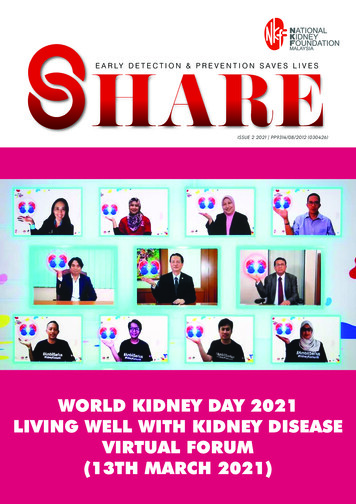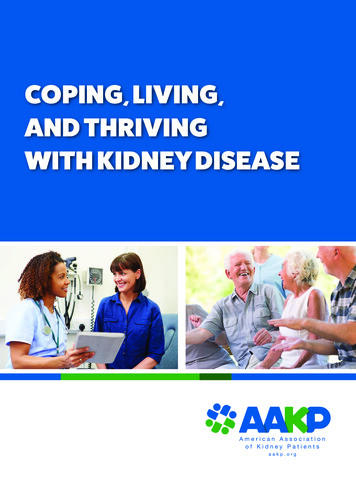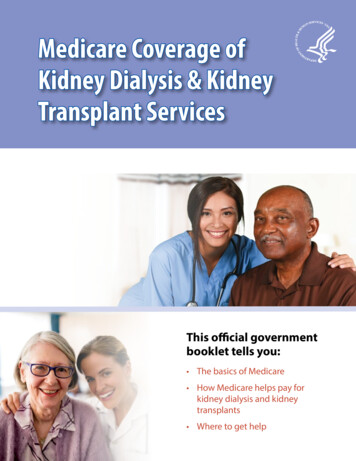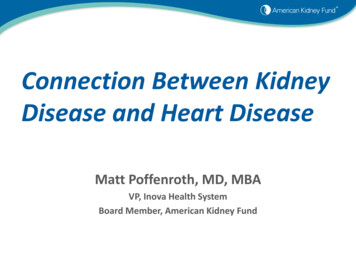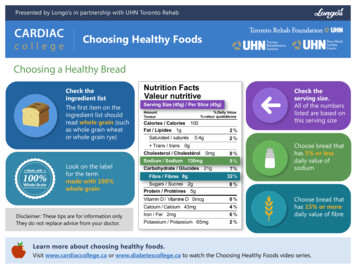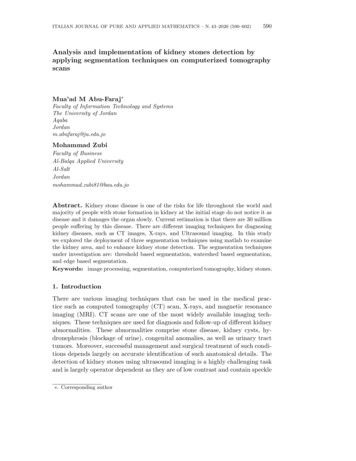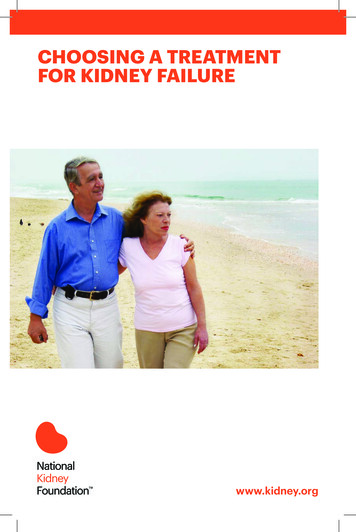
Transcription
CHOOSING A TREATMENTFOR KIDNEY FAILUREwww.kidney.org
National Kidney Foundation'sKidney Disease Outcomes Quality InitiativeDid you know that the National Kidney Foundation’s KidneyDisease Outcomes Quality Initiative (NKF-KDOQI ) offersguidelines and commentaries that help your doctor andhealthcare team make important decisions about your medicaltreatment? The information in this booklet is based on thoserecommended guidelines.What is your stage of kidney disease?There are 5 stages of kidney disease. They are shown in thetable below. Your doctor determines your stage of kidneydisease based on the presence of kidney damage and yourglomerular filtration rate (GFR), which is a measure of your levelof kidney function. Your treatment is based on your stage ofkidney disease. Speak to your doctor if you have any questionsabout your stage of kidney disease or your treatment.STAGES OF KIDNEY DISEASEStageDescriptionGlomerular Filtration Rate (GFR)*1Kidney damage (e.g., proteinin the urine) with normal GFR90 or above2Kidney damage with milddecrease in GFR60 to 893Moderate decrease in GFR30 to 594Severe reduction in GFR15 to 295Kidney failureLess than 15*Your GFR number tells your doctor how much kidney function you have. Aschronic kidney disease progresses, your GFR number decreases.
TABLE OF CONTENTSKidney Failure. . . . . . . . . . . . . . . . . . . . . . . . . . . . . . . . 5Hemodialysis. . . . . . . . . . . . . . . . . . . . . . . . . . . . . . . . 8Peritoneal Dialysis. . . . . . . . . . . . . . . . . . . . . . . . . . . 14Kidney Transplant . . . . . . . . . . . . . . . . . . . . . . . . . . . 16Living with Your Treatment Choice . . . . . . . . . . . . . 17For More Information. . . . . . . . . . . . . . . . . . . . . . . . 24
If your doctor said you may need dialysis or a kidneytransplant soon, you are probably wondering how todecide on the best choice for you. This booklet has generalinformation to help you and your family make this decision.You should talk about the pros and cons of each treatmentoption with your family, and healthcare professionals. Theywill help you decide which treatment is best for you.4NATIONAL KIDNEY FOUNDATION
Kidney FailureWhat happens when your kidneys fail?Your kidneys normally remove wastes and extra fluid fromyour blood. When your kidneys fail because of diseaseor injury, wastes and extra fluid can build up in your bloodand make you sick. You may have some of the followingsymptoms: nausea trouble sleeping poor appetite fatigue hiccups dry, itchy skin weight loss muscle cramping at night abnormal bleeding or bruising easily swelling of your feet or ankles puffiness around your eyes anemia (low red blood cell count) trouble breathing or feeling short of breathWWW.KIDNEY.ORG5
When is treatment needed?Your doctor will help you decide when you need to starttreatment. This decision is based on: your symptoms other health problems you have how much kidney function you have left your nutritional healthTo help know when you need to start treatment, yourdoctor should give you a simple blood test to estimate yourglomerular filtration rate (GFR). This tells how much functionyour kidneys have.How is GFR calculated?Your doctor can estimate your GFR from the results of asimple blood test for creatinine. Creatinine is a waste productof your body’s muscle activity. Your kidneys usually keep thelevel of creatinine just right. Your creatinine result is used ina math formula with your age, race and gender to determineyour GFR.If your GFR falls below 30, your doctor should give youinformation about treatments for kidney failure. If your GFR isbelow 15, you will need to start one of these treatments soon.How do I know which treatment is best for me?The two treatments for kidney failure are dialysis and kidneytransplantation. Two different kinds of dialysis can be done—hemodialysis and peritoneal dialysis. Each type of treatmenthas pros and cons. As you find out more about each one,speaking with your doctor and your family can help youdecide which treatment is best for you.6NATIONAL KIDNEY FOUNDATION
Your decision should be based on many things: medical condition lifestyle personal preferenceNo matter which treatment you choose, you need to make acommitment to follow your treatment plan. This involves: following your treatment schedule following your special diet taking all your medicines as instructedFollowing your treatment plan will help you live longer andfeel better.WWW.KIDNEY.ORG7
HemodialysisWhat is hemodialysis?Hemodialysis is a treatment that removes wastes and extrafluid from your blood. During hemodialysis, your blood ispumped through soft tubes to a dialysis machine where itgoes through a special filter called a dialyzer (also calledan artificial kidney). As your blood is filtered, it is returnedto your bloodstream. Only a small amount of blood is outof your body at any time. In order to be connected to thedialysis machine, you need to have an access, or entrance,to your bloodstream. (See page 12, “What is a hemodialysisaccess?”) Treatments are usually done 3 times a week.Each treatment lasts about 3 to 5 hours.Where can I have hemodialysis treatment?Hemodialysis treatments can be done at home or in a dialysiscenter. Dialysis centers may be located within a hospital orin a separate facility. You and your healthcare provider willdecide which place is best, based on your medical conditionand your wishes.What is required to do hemodialysis at home?Your home must have enough space for the equipmentand enough water drainage and electric power to operatethe dialysis machine and water purification unit. Medicaremay help cover the cost of minor changes to your homefor home hemodialysis.You will also need a dialysis care partner. Usually this is afamily member or friend, but may also be someone you hireto assist you. You and your partner will be trained in how todo hemodialysis at home.8NATIONAL KIDNEY FOUNDATION
Are there different types of home hemodialysis?With home hemodialysis, you will have 3 different types oftreatment schedules to choose from. These choices are: Conventional home hemodialysis. Treatments are usuallydone 3 times a week, and each treatment lasts about3 to 5 hours. Short daily home hemodialysis. This involves moretreatments each week for shorter periods. For example,you might do 6 treatments a week (compared with theusual 3). Each treatment would last about 1½ to 2½ hours.Many people feel that their quality of life improves withthis method of dialysis because they sleep better andhave better control of blood phosphorus levels, bloodpressure and anemia (low red blood cell count). Nocturnal (nighttime) home hemodialysis. This involveslong, slower treatments, which are done during the sleephours, usually for 6 to 8 hours. Many people sleep betterand have better control of blood phosphorus levels, bloodpressure, and anemia with this method of dialysis.WWW.KIDNEY.ORG9
Comparing Hemodialysis: At Home Versus in a CenterHOME HEMODIALYSISAdvantages:Disadvantages:1. Dialysis is done in thecomfort of your ownhome.1. Space in the home needsto be dedicated to themachine, water system(if needed) and supplies.2. You do not need to travelto a dialysis center.3. You have more flexibilityto choose a time of dayto do dialysis.4. You and your dialysispartner learn how to dotreatments independentof the center staff.2. A dialysis partner mustbe present while you areon dialysis.3. Both you and yourdialysis partner must taketime off work or regularroutine to attend training.5. There is a greater senseof control from havingindependence with thetreatment schedule inrelation to your life andwork schedule.10NATIONAL KIDNEY FOUNDATION
IN DIALYSIS CENTERAdvantages:Disadvantages:1. Trained staff performsall aspects of treatment.(You may be able to dosome things yourself,like insert the needles.)1. Treatment day andtimes are scheduledby the center.2. Since other people aredialyzing at same time,friendships may develop.2. You must travel to thecenter at least threetimes weekly.3. Other people are doingdialysis at same time,so you have less privacy.4. Loved ones may worryif they can’t be with youduring treatment.5. There may be rulesagainst eating anddrinking while on dialysis.WWW.KIDNEY.ORG11
What is a hemodialysis access?If you choose hemodialysis, you need to have a permanentaccess, or entrance, to your bloodstream. This is done withminor surgery, usually to your arm.There are three different types of access: FistulaA fistula is the recommended choicefor an access. It is made by joiningan artery to a nearby vein under yourskin to make a bigger blood vessel.ArteryThis type of access is recommendedFistulabecause it has fewer problems andlasts longer. You should be looked atVeinby a special doctor called a vascularsurgeon at least 6 months before youwill need to start dialysis. Your kidneydoctor or the surgeon may order an ultrasound evaluationof your blood vessels to see the ideal ones for the fistula.This is called “vessel mapping.” A fistula should be placedearly (several months before starting dialysis), so it hasplenty of time to heal and be ready for use by the timeyou begin hemodialysis. GraftVeinArteryIf your blood vessels are notsuitable for a fistula, a graft maybe used. This involves joining anartery and nearby vein with asmall, soft tube made of syntheticmaterial. The graft is entirelybeneath your skin.Graft12NATIONAL KIDNEY FOUNDATION
CatheterThe third type of access, calleda catheter, is inserted intoa large vein in your neck orchest. The ends of the tubessit on your skin outside yourbody. This type of access isgenerally used when you needdialysis for a short period ofCatheter Tubestime. Catheters are used asa permanent access when a fistula or a graft cannotbe placed.What happens after the fistula or graft heals?After the fistula or graft has healed and dialysisis started, two needles will be placed—one in theartery side and one in the vein side of the access—every time you have treatment. The needles are thenconnected to soft plastic tubes. One tube carriesyour blood from the needle to the dialyzer (theartificial kidney) where it is cleaned. The cleanedblood is returned to you through the other tubing.WWW.KIDNEY.ORG13
Peritoneal DialysisWhat is peritoneal dialysis?In peritoneal dialysis (PD), your blood is cleaned inside yourbody, not outside your body. The lining of your abdomen(the peritoneum) acts as a natural filter.A cleansing solution, called dialysate, flows into yourabdomen (your belly) through a soft tube called a PDcatheter. The PD catheter is placed during minor surgery.Wastes and extra fluid pass from your blood into thecleansing solution.After several hours, you drain the used solution from yourabdomen and refill with fresh cleansing solution to begin theprocess again. Removing the used solution and adding freshsolution takes about a half hour and is called an “exchange.”Peritoneal dialysis can be done at home, at work, at school,or even during travel.Peritoneal dialysis is a home-based treatment. Many peoplewho choose peritoneal dialysis feel it allows them greaterflexibility and independence.TIPPeritoneal dialysis might be a good choice if you: live far from a clinic or have no reliable transportationto a dialysis center are working or are in school like to travel prefer to be in control of your treatment fear needles are soon expecting a transplant14NATIONAL KIDNEY FOUNDATION
Are there different types of peritoneal dialysis?Yes. The major ones are: Continuous Ambulatory Peritoneal Dialysis (CAPD). WithCAPD, you do the exchanges yourself 4 to 6 times a day. Automated Peritoneal Dialysis (APD). With APD, amachine called a cycler does the exchanges automaticallyonce you have set up the equipment. APD can be donewhile you sleep. However, if you do APD, you may alsoneed to do 1 or 2 exchanges yourself during the dayto make sure enough wastes and extra fluid are beingcleared from your blood.WWW.KIDNEY.ORG15
Kidney TransplantWhat is a kidney transplant?A kidney transplant is an operation that places a healthykidney from another person into your body. The kidneymay come from someone who has died or from a livingperson who may be a close relative, spouse, or friend. It caneven come from someone who wishes to donate a kidneyto anyone in need of a transplant. Your new kidney willbe placed in your lower abdomen and connected to yourbladder and blood vessels.The transplant operation takes about 3 hours and you will bein the hospital for about 5 to 7 days. After the transplant, youwill need to take special medications to prevent your bodyfrom rejecting the new kidney. You will have to take thesemedications for as long as you have the transplant. Manypatients prefer a transplant over dialysis because it givesthem more freedom, allows for a less restricted diet and mayimprove the quality and length of life.A kidney transplant is a treatment, not a cure. A person witha kidney transplant still has kidney disease, and may needsome of the other medicines they took before the transplant.16NATIONAL KIDNEY FOUNDATION
Could I get a transplant before going on dialysis?Yes. In fact there are long-term benefits of having a transplantwithout having dialysis first. Your healthcare professional canrefer you to a transplant center for tests. Or you can contacta local transplant center directly. (To locate a transplantcenter, see page 25.) If a family member or friend is willing todonate a kidney, the tests can be started right away. If there isa “match,” surgery can be scheduled. However, if you do nothave a living donor, you will need to be on a waiting list untila kidney from a suitably matched deceased donor becomesavailable. In the meantime, you can have dialysis treatments.Living With Your Treatment ChoiceWill I feel better after I start treatment?Once you get used to your treatment, you should begin tofeel better. The dialysis treatments or transplanted kidney willtake over some of the work of your damaged kidneys andremove wastes and extra fluid from your body. This will makemany of your symptoms better.If I choose one type of treatment for kidney failure,will I be able to change to another type?If you start on one type of treatment but feel you wouldlike to try something else, you can speak to your healthcareprofessional about the possibility of changing. For example,if you choose hemodialysis, it doesn’t mean you can’t ask toswitch to peritoneal dialysis at a later date. Even if you chooseto have a kidney transplant, you may need a period of dialysisuntil you can be transplanted with a new kidney. It is notuncommon for people who have had kidney failure for manyyears to have had more than one type of treatment in that time.WWW.KIDNEY.ORG17
Will I need to take special medications?You may need to take: Phosphate binders. These medicines keep your bonesstrong by helping your body keep the right balance oftwo important minerals—calcium and phosphorus. A special prescription form of vitamin D. This medicinealso helps to keep your bones healthy. Drugs called ESAs (erythropoiesis-stimulating agents).ESAs act like a natural hormone made by your kidneyscalled erythropoietin. This hormone tells your body tomake red blood cells. Not having enough of it can causeanemia (low red blood cell count). Treatment with an ESAcan help your body make red blood cells. Extra iron. Your body also needs iron to make red bloodcells, especially if you are receiving ESAs. Without enoughiron, your ESA treatment will not work as well.TIPPart of the reason you feel so tired may be becauseof anemia (low red blood cell count). Treatment tocorrect anemia will help you to feel stronger and havemore energy. Vitamin and mineral supplements. You may need toreplace some vitamins and minerals that you are notgetting in your diet, or that are lost during dialysis. Yourhealthcare provider or dietitian will tell you which onesyou need to take. Other medicines. You may need to take other medicines,depending on your own medical needs. These couldbe medicines to control high blood pressure, highcholesterol, or diabetes.18NATIONAL KIDNEY FOUNDATION
If you have a transplant, you may also need to take: Anti-rejection medicines. These medicines help to keepyour body from rejecting the new kidney.Will my diet have to change?Yes. The type of diet you follow will depend on the treatmentyou receive. Your dialysis or transplant center will have adietitian who will help you plan your food choices to makesure you are getting the right amount of protein, calories,vitamins, minerals and fluids. The dietitian will help you makea nutrition plan that helps you continue to enjoy your favoritefoods and be as healthy as possible.Can exercise help me?Yes. Exercise can help you feel stronger and improve youroverall well-being. Walking is good way to exercise. Youshould speak to your doctor about an exercise program thatis right for you.How long can I live on dialysis?Now that we know more about how to care for people withkidney failure, they live longer, feel better, and have moreactive lives. Your overall health and how well you followyour treatment plan are important in how well you do. Ifyou choose dialysis, it is important to get the right dose ofdialysis. Studies have shown that dialysis patients do betterand live longer when they get enough treatment. Your dialysiscare team can measure how much dialysis you receive. Thisshould be done on a regular basis to make sure treatmentsare cleaning enough wastes out of your blood.WWW.KIDNEY.ORG19
Can I work if I am on dialysis or have a transplant?Yes. It is possible to work with dialysis or after a transplant.Returning to work may help you feel more positive andindependent. If you get in-center dialysis, the staff may beable to arrange your treatments to fit your work schedule.If you do home dialysis, you can fit your treatments intoyour own schedule.TIPTo learn more about treatment choices for kidney failure,speak to your doctor or other members of your healthcareteam. Ask them to arrange for you to meet with a personwho is on dialysis or who has had a kidney transplant. Ifinformation seminars are available, try to attend—and takea family member or close friend.What insurance coverage is available?Many of the costs of dialysis and kidney transplant are coveredby the federal government through Medicare. Medicare is notjust for people who are 65 and older. The program also helpsAmericans and legal residents of all ages who need dialysis ora kidney transplant and qualify for coverage.People with kidney failure can enroll in Medicare at their localSocial Security office, or by calling 800.772.1213 and makingan appointment to enroll. Before signing up, your dialysisclinic or transplant program must complete a form and haveit signed by your doctor, verifying you have started dialysisor received a kidney transplant. To find your local office,look for Social Security Administration in the governmentpages of your phone book or go to www.socialsecurity.gov/locator.20NATIONAL KIDNEY FOUNDATION
When does Medicare begin to pay?Medicare will begin to cover dialysis treatments or a kidneytransplant when: You start your third full month of in-center hemodialysis You start a home dialysis training course at a Medicareapproved facility within the first three months oftreatment, and you plan to do home dialysis You are admitted to a Medicare-approved hospital for atransplant, or up to two months before admittance ifpre-transplant healthcare and testing are begun You are already on MedicareHow much will Medicare cover?Medicare may pay up to 80% of the costs associated withdialysis and kidney transplant. But Medicare alone is notenough. Many other sources of coverage are available to helppay for what Medicare does not cover, including: Employer health insurance, private health insurance,COBRA State programs such as Medicaid and high-riskinsurance pools Veteran’s benefits State kidney programs Medigap (Medicare supplemental health insurance)To learn more about all your options for insurance coverage,you can speak to: Your state insurance commissioner and ask what optionsare available to you where you live An independent insurance brokerWWW.KIDNEY.ORG21
The NKF Cares Patient Help Line toll-free at855.NKF.CARES (855.653.2273) or emailnkfcares@kidney.org A financial aid coordinator at your dialysis centeror transplant center Your county or state social service departmentor Medicaid officeDoes Medicare pay for home hemodialysis?The federal government’s Medicare program covers the costof home hemodialysis just as they do for dialysis in a hospitalor other treatment center. However, Medicare will not coverthe cost of a home health aide if you have no one who canbe a care partner for you.How can my family and I cope with kidney failure?You and your family may have difficulty accepting the changesin your lives caused by kidney failure, which can be a lot tohandle. You may have feelings of frustration, guilt, denial,anger and depression. You and your family may find it helpfulto share your questions and concerns with each other and withpeople who are willing to offer support. These can includeclose friends and members of the healthcare team. The socialworker at your dialysis center is trained to provide counselingto help you make the transition to dialysis or transplantation.Some of the biggest changes are: getting used to a new routine with peritoneal dialysisor hemodialysis following your diet and nutrition plan taking all your medicines exactly as instructed by yourdoctor (including anti-rejection medicines if you havea transplant)22NATIONAL KIDNEY FOUNDATION
continuing with your work, studies, school, familycommitments, and hobbiesThe healthcare team (social workers, dietitians, doctors,nurses, technicians, and other staff) are trained to help youmake these changes and to help you understand all areasof your care.Is it normal to have fears about beginning treatment?Yes. It is normal to have concerns about how you will feel,whether the treatment will hurt, what the staff and otherpatients will think of you, and how long you can live withthe disease.The following steps can help you cope with your feelings: Ask your healthcare provider if you can visit a dialysiscenter. Visiting the center can help you make choices. If you are interested in a kidney transplant, ask yourhealthcare provider for a referral to a transplant center.Set up an appointment to visit with the staff and makea list of questions. Speak to others who have been through the sameexperience. Discuss all your concerns with the healthcare teamat the treatment center. Call your local National Kidney Foundation (NKF) officefor information and a list of the programs and servicesavailable. Find your local NKF office by visiting theNKF website at www.kidney.org or by calling theNKF Cares Patient Help Line toll-free at 855.NKF.CARES(855.653.2273) or emailing nkfcares@kidney.orgWWW.KIDNEY.ORG23
For More InformationTo learn more about treatments for kidney failure, call theNational Kidney Foundation’s NKF Cares Patient Help Linetoll-free at 855.NKF.CARES (855.653.2273) or emailnkfcares@kidney.org or visit www.kidney.orgYou may be interested in asking for a free copy of thefollowing National Kidney Foundation’s booklets:Coping Effectively: A Guide for Patients and Their FamiliesOrder# 11-10-0503Getting Ready for a “New Normal”: A Helpful Guide forStarting DialysisOrder# 11-10-0307Hemodialysis: What You Need to KnowOrder# 11-50-0214 [Spanish #11-50-0219]Hemodialysis Access: What You Need to KnowOrder# 11-50-0216 [Spanish #11-50-0220]Kidney TransplantOrder# 11-10-0304Nutrition and Kidney Failure: Are You Getting What You Need?Order# 11-50-0115Peritoneal Dialysis: What You Need to KnowOrder# 11-50-0215 [Spanish #11-50-0221]Staying Fit with Kidney DiseaseOrder# 11-10-050224NATIONAL KIDNEY FOUNDATION
Taking Control: Money Matters for People with ChronicKidney DiseaseOrder# 01-10-0250Working with Kidney DiseaseOrder# 11-10-0501You may also be interested in these helpful websites:For hemodialysis vascular access: www.fistulafirst.orgFor Medicare information: www.medicare.govFor Social Security benefits information:www.socialsecurity.govFor information on kidney disease:www.kidney.org/kidneydiseaseFor information on transplantation:www.kidney.org/transplantation or www.unos.orgAnd learn more at www.kidney.orgWWW.KIDNEY.ORG25
Notes26NATIONAL KIDNEY FOUNDATION
The National Kidney Foundation is the leading organization in the U.S.dedicated to the awareness, prevention, and treatment of kidney disease forhundreds of thousands of healthcare professionals, millions of patients and theirfamilies, and tens of millions of Americans at risk.Help fight kidney disease.Learn more at www.kidney.org30 East 33rd StreetNew York, NY 10016800.622.9010 2013 National Kidney Foundation, Inc. 11-10-0352 IBD
Following your treatment plan will help you live longer and feel better. 8 NATIONAL KIDNEY FONDATION Hemodialysis What is hemodialysis? Hemodialysis is a treatment that removes wastes and extra fluid from your blood. During hemodialysis, your blood is


